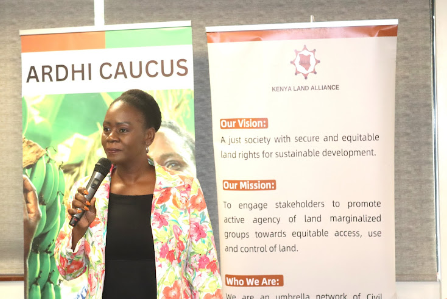A new caucus has been established to advocate for faster, people-centered, inclusive, and gender-responsive land reforms. The Ardhi Caucus aims to ensure that tenure security is achieved.
This caucus is a network of state and non-state actors united to advance land justice under five key themes: protection, recognition, and promotion of community-held land; tenure security for smallholder farmers; access to land justice; women’s land rights; and climate change adaptation and mitigation.
The caucus has been formed by the Kenya Land Alliance (KLA) and Landesa. KLA is an umbrella network of civil society organizations and individuals dedicated to effective advocacy for the reform of land policies and laws in Kenya.
Landesa is a global NGO that works to secure land rights for millions of the world’s poorest, primarily rural populations, to create opportunities and promote social justice.
Kenya Land Alliance CEO Faith Alubbe noted that the slow implementation of land reforms stems from a multitude of stakeholders and a diversity of stakes, interests, positions, perceptions, and ideologies, which lack a common space for building consensus.
“The divisions and disjointed interventions amongst the state and non-state actors on the implementation of land policy and laws have emerged as a critical threat to securing land tenure,” Alubbe said.
Building consensus among stakeholders is crucial in sustaining momentum and pressure for positive change.
Landesa Africa regional director Everlyne Nairesiae said there is a need for secured land tenure for sustainable development.
“There is a need for synergies and pulling together of different stakeholders in the land sector,” she said.
The caucus provides an opportunity for everyone to participate in decision-making, which will enhance resource allocation to the sector. Approximately 70 percent of land in Kenya is held communally. For women living on community land to feel secure, it is essential that the land is protected, recognized, and registered in the name of the community.
The Constitution of Kenya 2010 and the Community Land Act, 2016, stipulate the registration of community land; however, the process has been slow. A study released in October last year revealed that only 46 group ranches have successfully transitioned into community land nationwide, accounting for just 14.6 percent.
The study, titled ‘Monitoring Transition of Group Ranches to Community Land in Kenya,’ found that there were 315 undissolved group ranches at the time the Community Land Act was enacted in 2016. This study was initiated by the National Land Commission in collaboration with Namati in 2021 and concluded in May this year.
More than 60 percent of all land in Kenya is communal. The study identified several reasons for the slow progress, including conflicts among group members (39.7 percent), financial constraints (22.5 percent), insufficient information on processes and procedures (20.6 percent), and challenges related to registration processes (17.2 percent).
The Ardhi Caucus will also address the various challenges faced by smallholder farmers, who contribute approximately 70 percent of the food produced in the country.
Key challenges that the caucus will tackle include issues related to succession, land boundary disputes, conflicts associated with customs and traditions that deny women access to land, and challenges affecting women, men, youth, and persons with disabilities. These challenges include ambiguous procedures, arbitrary decisions, and high transaction costs that impede access to land rights.
Additionally, the caucus will work on factors that prevent women from owning land. The Federation of Women Lawyers in Kenya has noted that the country has made positive strides in developing a constitution that aligns with international standards of gender equality and enacting laws that support these constitutional provisions.
Article 40 of the constitution guarantees the right to property ownership, while Article 60 ensures equitable access to land and security of land rights.
Despite the progress made, deeply entrenched patriarchal norms and attitudes continue to hinder the achievement of the equality envisioned in the Constitution of Kenya 2010.
According to its training handbook, the Federation of Women Lawyers in Kenya (Fida) notes that although the estimated ratio of women to men is equal, only five percent of land title deeds in Kenya are held by women, either solely or jointly with men.
Just one percent of land titles are held exclusively by women, while women make up 89 percent of the subsistence farming labor force. The federation also highlights that women contribute 70 percent of the labor in cash crop production, and approximately 32 percent of households are headed by women.
“A complex mix of cultural, legal and social factors and obstacles stand in the way of women realising equal property rights in Kenya. The few statutes that could advance women’s property rights in the past deferred to religious and customary property laws that privilege men over women.”
Fida identifies several challenges that hinder women from owning land, including cultural beliefs, lack of awareness, discriminatory official responses, an expensive legal system, fear, lack of participation, and legal discrimination.
To tackle the issue of land ownership, the Ardhi Caucus will raise awareness about the importance of women’s land rights among policymakers, community leaders, and the general public. The caucus will also empower women by equipping them with the knowledge and skills needed to assert their rights and advocate for gender-responsive land policies and programs.
Additionally, the caucus aims to foster dialogue and collaboration between men and women to challenge traditional gender norms and promote equitable access to land resources. It will provide legal aid and support services to women facing land tenure insecurity or land-related disputes.
Furthermore, the Ardhi Caucus will integrate climate considerations into land use planning, land tenure systems, and natural resource management policies to help build resilient communities.



